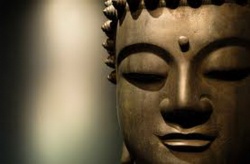Difference between revisions of "Fusion of reality and wisdom"
| Line 1: | Line 1: | ||
[[File:Ima5421ges.jpg|thumb|250px|]] | [[File:Ima5421ges.jpg|thumb|250px|]] | ||
| + | |||
| + | |||
| + | |||
| + | |||
| + | |||
<poem> | <poem> | ||
[[fusion of reality and wisdom]] | [[fusion of reality and wisdom]] | ||
| + | |||
[[境智冥合]] (Jpn [[kyochi-myogo]] ) | [[境智冥合]] (Jpn [[kyochi-myogo]] ) | ||
| − | |||
| − | In The Annotations on "The Words and Phrases of the [[Lotus Sutra]]," [[Miao-lo]] (711-782) associates [[Shakyamuni Buddha]] and Many [[Treasures]] [[Buddha]] as they are portrayed in the "[[Treasure]] Tower" (eleventh) chapter of the [[Lotus Sutra]] with the fusion of [[reality]] and wisdom.This chapter describes [[Shakyamuni Buddha]] seated side by side with Many [[Treasures]] [[Buddha]] in the [[treasure]] tower. | + | |
| + | The fusion of the [[objective]] [[reality]] or [[truth]] and the [[subjective]] [[wisdom]] to realize that [[truth]], which is the [[Buddha nature]] [[inherent]] within one's life.Since [[enlightenment]], or [[Buddhahood]], is defined as the [[state]] in which one fully realizes the [[ultimate reality]], the fusion of [[reality]] and [[wisdom]] means [[enlightenment]]. [[T'ient'ai]] (538-597) discusses this [[principle]] in The [[Words and Phrases]] of the [[Lotus Sutra]]. | ||
| + | |||
| + | |||
| + | In The Annotations on "The [[Words and Phrases]] of the [[Lotus Sutra]]," [[Miao-lo]] (711-782) associates [[Shakyamuni Buddha]] and Many [[Treasures]] [[Buddha]] as they are portrayed in the "[[Treasure]] Tower" (eleventh) [[chapter]] of the [[Lotus Sutra]] with the fusion of [[reality]] and wisdom.This [[chapter]] describes [[Shakyamuni Buddha]] seated side by side with Many [[Treasures]] [[Buddha]] in the [[treasure]] tower. | ||
| + | |||
| + | |||
| + | [[Miao-lo]] writes that these two [[Buddhas]] seated in this manner signify the fusion of [[reality]] and [[wisdom]]. [[Nichiren]] (1222-1282) identifies the Law that underlies the fusion of [[reality]] and [[wisdom]] as [[Nam-myoho-renge-kyo]], and asserts that he [[embodied]] his [[enlightenment]] to that Law—the fusion of [[reality]] and [[wisdom]] in the [[form]] of the [[Gohonzon]], the [[object]] | ||
| + | |||
| + | of devotion.he established In terms of [[Buddhist]] practice for [[people]] in the [[Latter Day of the Law]], [[Nichiren]] maintained that, when they [[chant]] [[Nam-myoho-renge-kyo]] with deep [[faith]] in the [[Gohonzon]], they achieve the fusion of [[reality]] and [[wisdom]] within their [[own]] [[lives]] and are thus able to [[manifest]] the [[Buddha nature]] and attain [[Buddhahood]]. According to [[Nichiren]], the | ||
| + | |||
| + | [[Buddha nature]] constitutes [[reality]], and [[faith]] in the [[Gohonzon]], the [[embodiment]] of that [[nature]], corresponds to wisdom.Nichiren states: "[[Reality]] means the [[true nature]] of all [[phenomena]], and [[wisdom]] means the [[illuminating]] and | ||
| + | |||
| + | [[manifesting]] of this true nature.Thus when the riverbed of [[reality]] is infinitely broad and deep, the [[water]] of [[wisdom]] will flow ceaselessly.When this [[reality]] and [[wisdom]] are fused, one attains [[Buddhahood]] in one's {{Wiki|present}} form....What then are these two [[elements]] of [[reality]] and [[wisdom]]? They are simply the five characters of [[Nam-myoho-renge-kyo]]" (746). | ||
| + | |||
| + | |||
| − | |||
</poem> | </poem> | ||
{{R}} | {{R}} | ||
Latest revision as of 20:34, 15 February 2024
fusion of reality and wisdom
境智冥合 (Jpn kyochi-myogo )
The fusion of the objective reality or truth and the subjective wisdom to realize that truth, which is the Buddha nature inherent within one's life.Since enlightenment, or Buddhahood, is defined as the state in which one fully realizes the ultimate reality, the fusion of reality and wisdom means enlightenment. T'ient'ai (538-597) discusses this principle in The Words and Phrases of the Lotus Sutra.
In The Annotations on "The Words and Phrases of the Lotus Sutra," Miao-lo (711-782) associates Shakyamuni Buddha and Many Treasures Buddha as they are portrayed in the "Treasure Tower" (eleventh) chapter of the Lotus Sutra with the fusion of reality and wisdom.This chapter describes Shakyamuni Buddha seated side by side with Many Treasures Buddha in the treasure tower.
Miao-lo writes that these two Buddhas seated in this manner signify the fusion of reality and wisdom. Nichiren (1222-1282) identifies the Law that underlies the fusion of reality and wisdom as Nam-myoho-renge-kyo, and asserts that he embodied his enlightenment to that Law—the fusion of reality and wisdom in the form of the Gohonzon, the object
of devotion.he established In terms of Buddhist practice for people in the Latter Day of the Law, Nichiren maintained that, when they chant Nam-myoho-renge-kyo with deep faith in the Gohonzon, they achieve the fusion of reality and wisdom within their own lives and are thus able to manifest the Buddha nature and attain Buddhahood. According to Nichiren, the
Buddha nature constitutes reality, and faith in the Gohonzon, the embodiment of that nature, corresponds to wisdom.Nichiren states: "Reality means the true nature of all phenomena, and wisdom means the illuminating and
manifesting of this true nature.Thus when the riverbed of reality is infinitely broad and deep, the water of wisdom will flow ceaselessly.When this reality and wisdom are fused, one attains Buddhahood in one's present form....What then are these two elements of reality and wisdom? They are simply the five characters of Nam-myoho-renge-kyo" (746).
